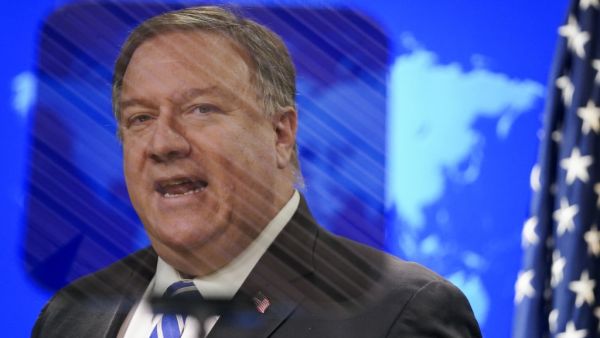US Secretary of State Mike Pompeo will travel to Israel Wednesday for talks with the country’s unity government, a strong show of support for Israel at a time of global crisis and as it considers going ahead with plans to annex parts of the West Bank.
Pompeo, who will be making his first trip abroad in over a month amid the coronavirus pandemic, is expected to stay in Israel for only a few hours, during which he will meet with incoming Prime Minister Binyamin Netanyahu and his coalition partner Benny Gantz.
After over a year of deadlock and three inconclusive elections, the rival Israeli politicians reached a power-sharing agreement under which they will each assume the premiership for revolving 18-month periods. Netanyahu, who is battling a pending indictment on corruption charges, will take office first, extending his consecutive 11-year tenure.
Pompeo will not be subject to Israel’s mandatory quarantine period for international travelers, but will undergo frequent health checks throughout the carefully planned trip. His visit is viewed as such a high priority that Israel has even postponed the scheduled inauguration of its new unity government by one day to accommodate him.
Pompeo told reporters that he would hold discussions on Iran’s “malign influence” across the region, efforts to combat the global coronavirus pandemic and US concerns over Israel’s commercial ties with China.
But on the top of the agenda is likely to be Israel’s annexation plans, which the US has green-lighted as part of the “Peace to Prosperity” deal it unveiled last January.
For months, Israel has been readying to strategically annex some 30% of the West Bank in the brief window of time before US presidential elections in November, when a less supportive Democratic administration could be voted in. But US officials still need to chart final details of the plan, including the status of Area C in the West Bank, and the prospect of Israeli-Palestinian negotiations.
"As we have made consistently clear, we are prepared to recognise Israeli actions to extend Israeli sovereignty and the application of Israeli law to areas of the West Bank that the vision foresees as being part of the State of Israel," a US State Department spokesperson said in late April.
In an interview with Israel Hayom on May 8, US Ambassador to Israel David Friedman affirmed that the US was prepared to recognise Israeli sovereignty over 30% of the West Bank after final negotiations.
“There’s really three things left that have to get done,” Friedman said. “The mapping has to get done. The (Israeli) government has to agree to the freeze on half of Area C, and most importantly, the government of Israel has to declare sovereignty.”
Friedman added that Israeli officials are pushing for a July timeline for annexation.
US President Donald Trump, a staunch supporter of Israel’s right-wing Netanyahu, hopes his support for annexation will bolster his popularity with pro-Israel voters, much like his decision to move the US Embassy to Jerusalem did in 2018.
Israel has for years conducted demolitions of Palestinian property and built illegal settlements in the occupied West Bank, complicating efforts to negotiate a future Palestinian state.
Netanyahu’s recent push to annex portions of the West Bank, including fertile areas of the Jordan Valley that Palestinians envision as part of their future state, drew harsh condemnation for Palestinians and raised some concerns in the Arab world and beyond.
Palestinian Prime Minister Mohammad Ishtaye called for world powers to come together and take measures against Israel if it goes forward with plan.
"Condemnation statements do not work with Israel, the response to annexation must be actual boycott and the recognition of the Palestinian state over 1967 borders, with East Jerusalem as its capital, and honoring the right of return for Palestinian refugees," said Ishtaye.
"The Palestinian state's geography stands on this area, together with East Jerusalem, Gaza Strip and all Palestinian territories," he said, adding "the Jordan Valley is our meeting point with Jordan, through which we go out to the world."
Palestine’s UN envoy Riyad Mansour further warned that Israel’s annexation “will destroy the two-state solution and entrench Israel’s military control over the Palestinian people and land.”
This article has been adapted from its original source.








